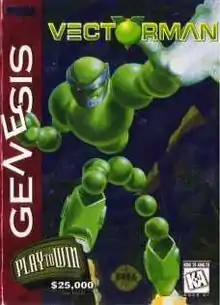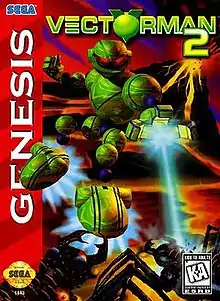Vectorman
Vectorman (stylized as VectorMan)[1] is a series of run and gun platform video games developed by BlueSky Software and published by Sega for the Sega Mega Drive/Genesis.
The first (and eponymous) game in the series was released in October 1995.[2] The games have since appeared on several game compilations, including the Sega Genesis Collection for the PlayStation 2 and PlayStation Portable, the Sonic Gems Collection for the Nintendo GameCube, and Sonic's Ultimate Genesis Collection for Xbox 360 and PlayStation 3. VectorMan was added to the Wii Virtual Console in 2007,[3] on Steam as part of the Sega Genesis Classics Pack, and as part of the Sega Forever service in 2018. In 2019, the game was included on the Sega Genesis/Mega Drive Mini console.
In 1996, a sequel, titled VectorMan 2, was released.
Games
VectorMan
| VectorMan | |
|---|---|
 North American cover art | |
| Developer(s) | BlueSky Software |
| Publisher(s) | Sega |
| Producer(s) | Jerry Markota Jenny Cleary |
| Designer(s) | Rich Karpp Mark Lorenzen |
| Composer(s) | Jon Holland |
| Platform(s) | Sega Genesis/Mega Drive |
| Release | |
| Genre(s) | Platform |
| Mode(s) | Single-player |
Story
In 2049, the human population of Earth embarks on a migratory voyage to try to colonize other planets. They leave mechanical "orbots" to clean up the mess they made on Earth through littering and pollution. Raster, a high-level orbot who watches Earth through a planetwide computer network, is accidentally attached to a working nuclear missile by a lesser orbot and goes insane, becoming an evil dictator named Warhead. He declares himself ruler of Earth, and begins preparing to execute any humans who dare return to their planet.
Enter VectorMan, a humble orbot in charge of cleaning up toxic sludge by simply discharging it into the sun. As he lands on Earth after his last trip, he finds chaos and confusion. Because all the other Orbots are controlled by Warhead (VectorMan having not been affected because he was away), VectorMan takes it upon himself to destroy the errant orbot and restore peace to Earth.
Graphics and gameplay
VectorMan uses pre-rendered 3D models in its level and character designs. This gives the game a smooth, computer-generated feel. The original name of the villain, Warhead, was Raster (as in raster graphics, the opposite of vector graphics). VectorMan was considered the answer to Nintendo's Donkey Kong Country at the time, as they both used graphical tricks to show graphics beyond what the console was thought capable of.
The game itself is a straightforward 2D action platformer. VectorMan is an "orbot" (a robot whose body is composed almost entirely of orbs) powered with a ball gun in his hand; power-ups include a machine gun, "bolo" gun, and triple-fire guns.
VectorMan possesses the ability to transform, through the use of power-ups, into several different forms: including a drill, to cut through floors; a bomb, to destroy all surrounding enemies or breakable walls; and an aquatic form, useful for swimming underwater. In addition to power-up transformations, three levels host unique morphed forms with which to combat bosses in. Overall, the game consists of 16 levels.
Development
VectorMan introduced the Genesis programming technique referred to by Sega as Vector Piece Animation.[4] The player character's body actually consists of 23 individual sprites programmed to move in unison.[4]
Reception
The four reviewers of Electronic Gaming Monthly gave the first VectorMan a score of 8.25 out of 10, unanimously praising the advanced graphics and animation, large levels with numerous hidden areas, strong audio, and ability to change into different forms.[5] GamePro's Scary Larry gave it a rave review, stating that "your jaw will hang open in amazement at what Vectorman does with the 16-bit Genesis engine. This platform game comes on with great guns, a morphing hero, and diverse, well-detailed levels." He also praised the simple controls, advanced graphics, and sound effects, and scored it a 5/5 in graphics, control, and FunFactor and a 4.5/5 in sound.[6] Both Electronic Gaming Monthly and GamePro awarded it Best Genesis Game of 1995.[7][8] Video Games The Ultimate Gaming Magazine gave the game a score of 9 out of 10 praising the graphics, describing the game variety and ingenuity as “nothing short of breathtaking” and concluding “If developers keep on pumping stuff like this out, then it’ll be a cold day in hell before 16-bit is dead and buried.”[9]
VectorMan 2
| VectorMan 2 | |
|---|---|
 Box art | |
| Developer(s) | BlueSky Software Drooling Dogs Studio[10] |
| Publisher(s) | Sega |
| Producer(s) | Jerry Markota Jerry Huber |
| Designer(s) | John Abad Marty Davis Keith R. Freiheit Jerry Huber Rick Randolph Rick Schmitz Ron Thompson Thi Truong Jason Weesner Dok Whitson |
| Platform(s) | Sega Genesis/Mega Drive |
| Release |
|
| Genre(s) | Action/platform game |
| Mode(s) | Single-player |
Story
After saving Earth from Warhead in the previous game, VectorMan's sludge barge is targeted and destroyed by a missile. VectorMan escapes, parachuting down to the planet to battle with the Earth's multitudinous enemy; mutant insects. Now it is up to VectorMan to fight through the mutant bugs and find the most fearsome source infestation; the evil Black Widow Queen.
Graphics and gameplay
The gameplay is similar to the previous game.[11] VectorMan has a different set of weapons, including a pulse beam, energy shot, and super shot guns. VectorMan can also now transform into animal forms such as a fire ant, a rhino, and a "shield bug" that repels attacks. Unlike the original VectorMan, the full-level transformations featured in this game are not used to combat bosses as that is left to the human-form VectorMan. There are 22 levels divided into seven parts in all.
Before VectorMan 2 was released, Sega Channel held a contest that allowed artists to draw a morph of VectorMan. Judges then chose the best one to be transformed in Genesis art, as well as being put on the Sega Channel. Ten runner-up submitters won a copy of VectorMan 2.[12]
Reception
Electronic Gaming Monthly gave VectorMan 2 a 7.25 out of 10. Shawn Smith, Dan Hsu, and Crispin Boyer applauded its traditional side-scrolling gameplay, huge levels, graphics, and animation, especially on the bosses. Sushi-X, in contrast, said that the levels are surprisingly small, making it a disappointment compared to the first game.[13] Scary Larry gave it a 4.5/5 in graphics and a 5/5 in every other category. He said that compared to the first game, it "has cleaner graphics, more sound and voice effects, and faster, smoother gameplay. Add to this spectacular and complex levels, and you have the makings of a Sega classic."[14] Electronic Gaming Monthly awarded it Genesis Game of the Year.[15]
Other VectorMan projects
A design document was completed for a third VectorMan title in the series which would have appeared on the Sega Saturn, but BlueSky Software's relationship with Sega ended before the proposal could be reviewed or green-lit. In 2000, six former BlueSky employees formed a new company called VBlank Software[16] to create original titles for the PlayStation 2. One of the projects they created was a demo for a new 3D VectorMan game which would have featured the character on an alien planet with new transformations. However, Sega had already established a relationship with Canadian developer Pseudo Interactive to create a VectorMan title that was based around a more traditional combat model and had a more serious tone.[17] VBlank Software never got to present its demo and Sega canceled Pseudo Interactive's VectorMan title after it was briefly shown at the 2003 E3.
References
- https://gamefaqs1.cbsistatic.com/box/6/8/1/21681_back.jpg Back Cover of Box
- Sega begins 24-hour countdown to "Vectormania"
- "Two WiiWare Games and Two Virtual Console Games Added to Wii Shop Channel". Nintendo. Nintendo of America. 2008-09-22. Archived from the original on June 22, 2018. Retrieved 2008-09-22.
- The Whizz (January 1996). "Sega Vectors in on Better Genesis Programming". GamePro. No. 88. IDG. p. 28.
- "Review Crew: Vectorman" (PDF). Electronic Gaming Monthly. No. 76. Sendai Publishing. November 1995. p. 42.
- "ProReview: Vectorman". GamePro. No. 76. IDG. November 1995. pp. 70–71.
- "Electronic Gaming Monthly's Buyer's Guide". Electronic Gaming Monthly. 1996.
- "Editor's Choice Awards 1995". GamePro. No. 79. IDG. February 1996. p. 26.
- Vectorman Review. L.F.P., Inc. November 1995. p. 89.
- https://www.imdb.com/title/tt0388509/companycredits?ref_=tt_dt_co
- "Vectorman 2: So Much Trash, So Little Time" (PDF). Electronic Gaming Monthly. No. 88. Ziff Davis. November 1996. pp. 256–7.
- "Sega Channel Memories pt2". 2007-06-10. Retrieved 2010-02-17.
- "Review Crew: Vectorman 2" (PDF). Electronic Gaming Monthly. No. 88. Ziff Davis. November 1996. p. 90.
- "ProReview: Vectorman 2". GamePro. No. 99. IDG. December 1996. p. 154.
- "The Best of '96" (PDF). Electronic Gaming Monthly. No. 92. Ziff Davis. March 1997. p. 86.
- Horowitz, Ken (2016-10-21). Playing at the Next Level: A History of American Sega Games. McFarland. ISBN 9780786499946.
- "Pseudo Interactive bounces back with physics engine". The Globe and mail. May 10, 2004. Retrieved 2018-09-11.
External links
Vectorman and Vectorman 2 can be played for free in the browser on the Internet Archive
- Vectorman at Mobygames
- Vectorman 2 at Mobygames
